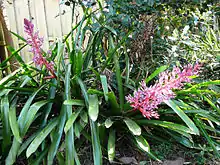| Portea petropolitana | |
|---|---|
 | |
| Scientific classification | |
| Kingdom: | Plantae |
| Clade: | Tracheophytes |
| Clade: | Angiosperms |
| Clade: | Monocots |
| Clade: | Commelinids |
| Order: | Poales |
| Family: | Bromeliaceae |
| Genus: | Portea |
| Species: | P. petropolitana |
| Binomial name | |
| Portea petropolitana | |
| Varieties | |
| |
Portea petropolitana is a plant species of the genus Portea, in the family Bromeliaceae.
Distribution
The bromeliad is endemic to the Atlantic Forest biome (Mata Atlantica Brasileira), located in southeastern Brazil.
It is found within the states of Bahia, Espírito Santo, Minas Gerais, and Rio de Janeiro (state)
Description
There are two varieties of Portea petropolitana that are cultivated as ornamental plants:
- Portea petropolitana var. petropolitana — native to Espirito Santo near the ocean. It may reach a height of 3 to 4 feet prior to flowering. The dark green leaves are heavily spined and form a stiff rosette. The inflorescence reaches 12 to 18 inches long, bearing colorful flowers with white lavender petals and orange sepals.[1]

Portea Petropolitana growing in shade.
- Portea petropolitana var. extensa native to Espirito Santo. Introduced by American plant collector and breeder M. B. Foster. It is smaller in all parts compared to the other variety.[2] It is characterized by light yellow green leaves and a coral red inflorescence with an upright rosette. The flower contains lavender petals, apple green overies, and berries that turn dark purple.[3]
References
- ↑ Padilla, Victoria (1973). Bromeliads. New York: Crown Publishers. pp. 60. ISBN 0517562413.
- ↑ Rauh, Werner (1979). Bromeliads For Home, Garden and Greenhouses. Nlandford Press Ltd. p. 349. ISBN 071370845X.
- ↑ Padilla, Victoria (1973). Bromeliads. New York: Crown Publishers. pp. 61. ISBN 0517562413.
This article is issued from Wikipedia. The text is licensed under Creative Commons - Attribution - Sharealike. Additional terms may apply for the media files.